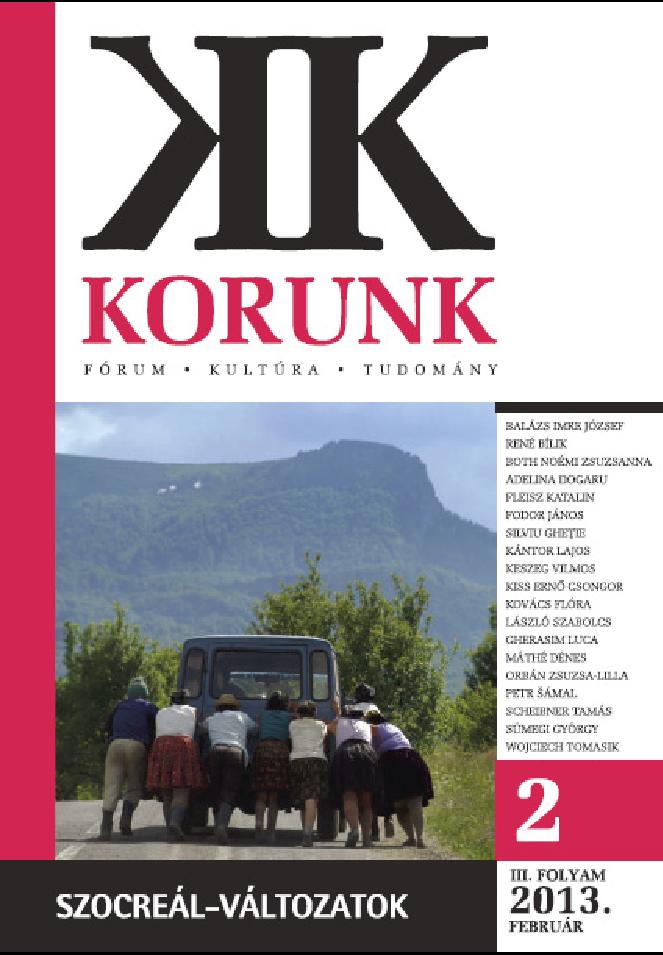
Betűportrék kifeszített pillanatokban
Hornyák József: Évek, õrangyalok. Szerelmeim, Pont, Bp., 2002.
More...We kindly inform you that, as long as the subject affiliation of our 300.000+ articles is in progress, you might get unsufficient or no results on your third level or second level search. In this case, please broaden your search criteria.

Hornyák József: Évek, õrangyalok. Szerelmeim, Pont, Bp., 2002.
More...
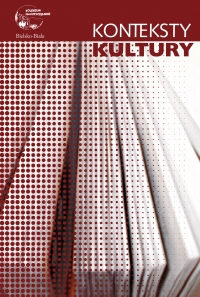
The article discusses a key issue in the writings of Imre Kertész (1929–2016), that is, contemplation on the effects of the concentration-camp trauma on the further life of survivors. In his books, the author touches upon problems faced by former inmates of concentration camps, often drawing on his own experience. The Nobel Prize winner reflects upon the former prisoners’ personalities, their problems in building relationships and their image of love and family distorted by war experiences. He also stresses the fact that many of them, unable to adapt to normal life, decided to commit suicide, while his escape from the trauma was just his writing.
More...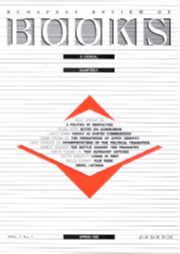
The review of: Lajos Hopp: Az “antemurale” és “conformitas” humanista eszméje a magyar-lengyel hagyományban (The Humanist Notions of Antemurale and Conformitas in Hungarian-Polish Tradition); Humanizmus és reformáció 19 (Humanism and Reformation Series 19), Budapest: Balassi Kiadó, 1992, 208 pp.
More...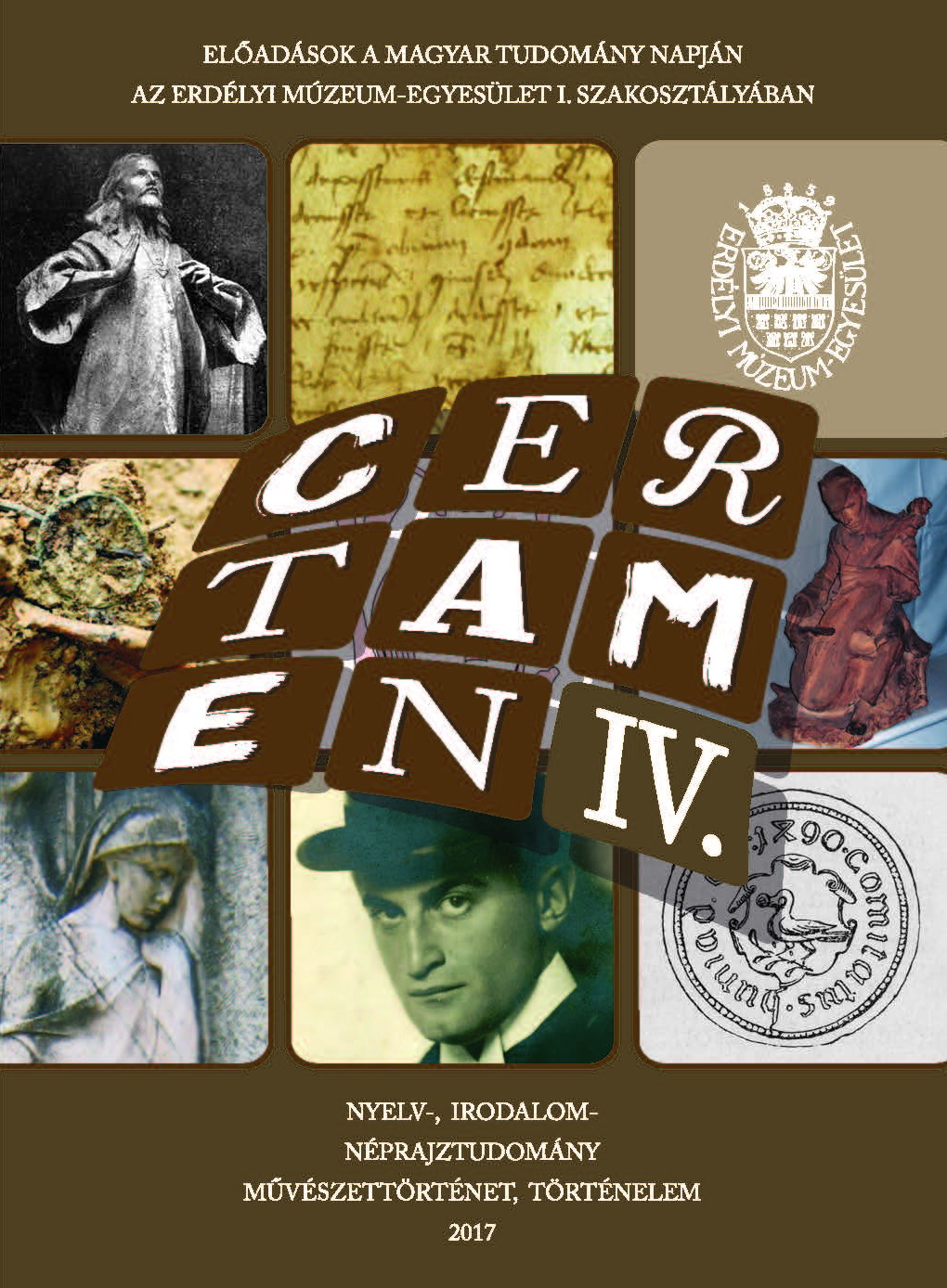
The study proposes the method of close-reading in order to define the core objective of the literary program formulated by Mihály Szatmárnémeti (1638–1689), a Reformed priest. As key elements in his activity, we could name the role of a prophet (he himself and his contemporaries identified him with this role, too) and his emphasis on promoting science. The method he chose for his objectives is presented using different examples from his oeuvre.
More...
The extremely successful Cambridge Apostle Ferenc Békássy stunned his British friends and colleagues when he returned to Hungary at the beginning of World War I to fight on the side of the Central Powers. This article is an attempt to reconsider Békássy’s reasons in light of historical and political events as well as in light of his poetic works. In particular, his long, dramatic poem “Adriatica”, which is also the title of a volume published in 1925 by Hogarth Press, reveals the importance Békássy placed upon the Adriatic region not simply for its geographic beauty but, more importantly, for its cultural and historical significance as a bridge between modernity and classical times, between East and West, North and South.
More...
This study is devoted to the mediators - translators, philologists, publishers, writers - thanks to which was carried out the transfer of the Tragedy of the man of Imre Madách in the Germanic cultural sphere of 1862 to 1892. This period was particularly fruitful to two points of view. On the one hand, it saw the birth of seven translations, as well as a dozen reviews and reviews. Those published between 1888 and 1892 were intended to prepare the public for the upcoming appearance of Tragedy on German stages. On the other hand, many personalities for the German-speaking intelligentsia have made eulogistic statements about the Hungarian drama, while others have even recaptured this foreign masterpiece by drawing inspiration from him.
More...
Travel writing has enjoyed continuous success since the Renaissance, and has been an important factor in shaping perceptions of individual and group identities. Especially during the second half of the eighteenth century and throughout the nineteenth century travelogues constituted an influential part of the discourse on culture, and helped, through their descriptions of the foreign and a reaffirmation of what is “us”, establish the ideology of nationalism. Works by British authors such as William Wordsworth and the travel writings of Hungarian poet Sándor Petõfi and politician, essayist, and novelist József Eötvös offer examples of different strategies of using landscape as means of affirming contours of national identity.
More...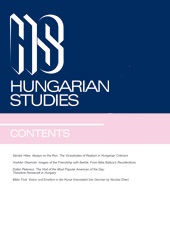
As a contribution to a larger theoretical discussion of the relationships between literature and political context, this paper offers an examination of the reception of the works of Hungarian poet and novelist Dezsõ Kosztolányi during the communist period, drawing particular emphasis to the origins of several misunderstandings. Over the past several decades Hungarian Marxist literary theorists, influenced by the philosophical and aesthetical heritage of György Lukács, have thought of artists as having a revolutionary role in society and literature as having an important role as a means through which to educate the nation. Kosztolányi’s concept of art for art’s sake did not minister to this ideological and political system, and as a consequence his reception and reputation suffered. Not only were critical evaluations of his writings, both literary and theoretical, distorted and crafted with the intention of creating a misleading image of the author, but the editions of his texts were also censored. It is not mere accident or circumstance that the critical edition series of his works could not be edited and research groups and projects dealing with an edition of his life’s work were not financed under the communist regime. Hungarian intellectuals have yet to raise the question as to why open discussion of the beginning of the 20th century (when events took place that continue to exert an influence on conceptions of culture today) remains a taboo. Why are there no (or few) critical editions and anthologies or studies dealing with the period? Twenty years have passed since the political transition and the situation remains essentially the same. Hungarian philologists who deal with Kosztolányi’s oeuvre must address these questions and challenge the Marxist axioms and stereotypes if they hope to further the development of Kosztolányi’s reception. Relying on postmodern theories is not sufficient if there is little fundamental research.
More...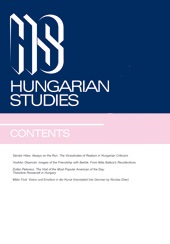
The historical legacy of the Austro-Hungarian Monarchy remains a subject of considerable debate and particular significance in an increasingly unified Europe. Given that political unification has by no means led to any widespread consensus concerning interpretations of the half-century of European history preceding the outbreak of World War I, it may be worthwhile to consider how the memory of this geographically large and nationally and linguistically diverse state has shifted in different historical periods. This article seeks to further an understanding of the contentious legacy of the Dual Monarchy through discussion of examples from works by Hungarian authors, in particular Dezsõ Kosztolányi, Gyula Krúdy, and Sándor Márai.
More...
In the first decade after the collapse of state communism, Transylvania-born Ádám Bodor’s novel Sinistra District has been praised as one of the most accomplished allegories about Ceaupescu’s totalitarian regime. Reread today, the novel reveals its virtue as a historiographical reflection of much larger time-span. Looking at the “natural history” and ethnography of Sinistra District, the author draws parallels with Transylvanian regional historiographies, from the Enlightenment to the 20th century, including references to the local lore.
More...
My reading of Ádám Bodor’s novel Sinistra körzet (Sinistra District, 1992) shows that the political dimension of literary production cannot be reduced to the problem of referentiality (the correct representation of an empirical reality in a realist or an allegorical narrative). In fact, Bodor’s fiction suggests that it is precisely the breakdown of the referential paradigm that is the privileged political moment in literature. As I argue, Bodor’s text suggests that beyond the political realism of historical referentiality we find a new kind of geopolitics based on a regionalist aesthetics of “mood.” In this regard, it becomes clear that the “Sinistra District” is not an allegorical representation of a historical reality (the world of totalitarian regimes) but a rhetorical figure which stages the ideological fantasy that structures that given historical realty.
More...
In a world of globalization it is the task of literary historians to reassess their national legacy from the new perspective. The past can never be taken for granted and never be forgotten; it is the result of interpretation. Poetic traditions are inseparable from linguistic structures, language as collective memory, and so they cannot be easily transferred into another culture. If historiography cannot do without teleology, we have to think in terms of different teleologies. It is undeniably difficult to fulfill contradictory demands, but a literary historian cannot stop making arguments and counterarguments.
More...
The essay discusses the renewed interest in Jewish subjects in post-1989 Hungary and, more specifically, popular new Hungarian fiction dealing naturalistically and anecdotally with the Hungarian Jewish experience – fiction written in most cases by “engagé” Hungarian Jewish writers. The essay also touches on the phenomenon of “de-Judaized” Hungarian Jewish literature, in which the Jewish content is masked, concealed, universalized, and with Hungarian writers of Jewish descent who object to the category of “Hungarian Jewish” literature. It is in this context that the essay deals with Imre Kertész and his works, and attempts to show that while his novels deal explicitly with the Hungarian Jewish “fate”, or fatelessness, he is always intent on suggesting the universal relevance of this state of fatelessness.
More...
Im Jahre 1909 brachen der Wiener Aktivist Rober Müller (1887–1924) und der Budapester Aktivist Lajos Kassák (1887–1967) zu einer jeweils exotischen Reise auf: Müller bereiste die Vereinigten Staaten, Mexiko, sowie einige Länder Mittelund Südamerikas, Kassák pilgerte nach Paris; er brauchte für seinen Fußmarsch etwa drei Monate. Es war nicht der Geist der Moderne oder der Avantgarde, die er dort suchte – „ich sah Paris und ich sah nichts“, schrieb er später –, es ging ihm, wie auch Müller im Urwald, um die eigene Wiedergeburt als „neuer Mensch“, als Literat mit großer Öffentlichkeitswirkung. Die Berichte beider Ich-Reisen wurden in Wien verlegt, Müllers erschien 1915, Kassáks 1922 (dt. 1923). Müller und Kassák lebten 1920–1924 in derselben Stadt und hatten sicher Kenntis über die Arbeit des jeweils anderen. Dass sie einander nie auch nur mit einem Wort erwähnt haben, liegt daran, dass (vereinfacht gesagt) Kassáks Konzeption der Massenwirksamkeit eine linke war, während die von Müller eher aus Begriffen der rechten Ideologien bestand.
More...
The oldest extant Hungarian proverb collection – one of the first ones in East- Central Europe – can be found in the Adagiorum Graecolatinoungaricorum Chiliades quinque published in Bártfa in 1598. It was based on a 1574 Basel edition of the Adagiorum Chiliades by Erasmus, including collections of Gilbert Cousin and others, too. The 4827 Hungarian entries of the Adagia include about 900 proverbs, part of them in common use today, others known in certain regions while some fell into oblivion. About 100 of them can be found in about 30 books (e.g. Fables of Aesop by G. Heltai) and letters of earlier date. The author, János Baranyai Decsi, headmaster of the Székelyvásárhely school and graduate of the Strasbourg Academy also wrote a travel description, a book of comparative law, poems in Latin and Greek, translated Sallust into Hungarian, wrote on Hungarian runic writing, the history of his time (he died in 1601) survived in manuscript form.
More...
This essay examines the way Gáspár Heltai, one of the most important Hungarian writers and preachers in the Reformation period in the XVIth century, used proverbs in his works. The author of this article compiled proverbs which were collected from 5 of Heltai’s work. She shows that some of Heltai’s proverbs are used even today as she compares Heltai’s proverbs with the most sophisticated proverbs in the Hungarian language. Then she focuses on the contexts which were typical of Heltai’s proverbs: first, she compares the literal meaning of the proverb with the symbolic meaning. Secondly, she examines the way Heltai collects many proverbs in one tale. Thirdly, she analyzes the way Heltai frames some of his stories with proverbs at the beginning and at the end of his work. Next, she describes the logical relationships between sentences in the text and demonstrates the function of the proverbs in these logical relationships. Finally, by using phraseological examples, the author reveals the linguistical influence of German (Heltai’s native language) on these Hungarian proverbs.
More...
Seit es durch die Untersuchungen der Metapher klar und allgemein anerkannt wurde, daß die Metapher keine Erscheinung ist, die in den Grenzen eines einzigen Wortes erklärt werden kann, ist es theoretisch möglich, größere Textabschnitte oder ganze Texte metaphorisch zu interpretieren. Solche Interpretationsversuche sind trotzdem selten, obwohl ein solches Verfahren nicht nur für die Textinterpretation, sondern auch für die Metapherforschung fruchtbar sein könnte. Wie kann aber ein einziger Text metaphorisch interpretiert werden, wenn die Metapher eine Identifizierung zwei verschiedener Sachen ist und folglich zwei verschiedene Sachen voraussetzt? Ich sehe zwei theoretische Möglichkeiten. 1. Der Text ist die erste Sache, die zweite muß sich anderswo finden. Diese Erscheinung wäre in Zusammenhang mit der Metapher nicht überraschend, und auf Grund der Interaktionstheorie müßte eine solche Auffassung nicht bedeuten, daß der Text in Stelle eines - etwa diskursiven - Inhalts dasteht. 2. Man kann beide Elemente und vielleicht auch die Geste der Identifikation im Text selbst auffinden. Ich glaube, daß beide Möglichkeiten mit Nutzen ausgearbeitet werden können; ich werde mich im folgenden nur mit der zweiten - am Beispiel eines Textes, der die zwei Elemente und die Geste der Identifikation offensichtlich innehat - beschäftigen.
More...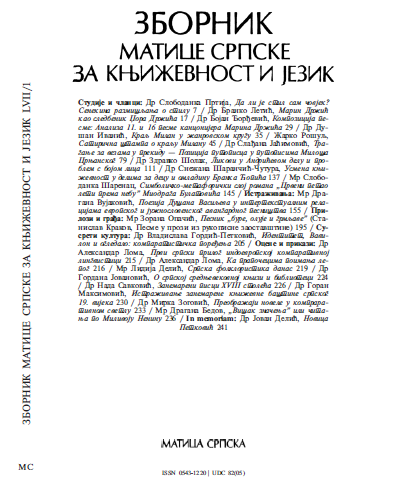
The paper points out the spiritual and poetic similarities between the poetry of Dušan Vasiljev and the poets of different expressionist streams in the German literature (nihilism of Georg Heym and Gottfried Benn, cosmism of Alfred Mombert, Theodor Deubler, activism of Johannes Becher, Ludwig Rubiner and others). The author then more extensively investigates the intertextual relations with the poetry of the Hungarian poet Endre Ady and the south Slavic poets of the expressionist period (Miroslav Krleža, Miloš Crnjanski, Srećko Kosovel). Dušan Vasiljev’s poetry is placed in a broader, international avant-garde context to establish more precisely the literary-historical position of this poet between the extremes of the expressionist streams — the abstract and activist ones.
More...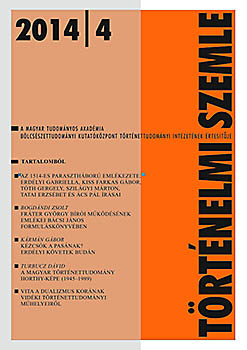
The study examines the role that the peasant revolt of 1514, generally attached to the name of György Dózsa, played in the collective memory in Hungary in the 1840s. It contests the argument according to which alongside the traditional, conservative approach, which condemned the revolt, there would have emerged a revolutionary view, which already presented the events as examples to follow. It argues, rather, on the basis of several contemporary literary works, that there continued to exist in the 1840s an attitude which extended back to 1514 and was influenced by consequent waves of violence, and which, as a result, regarded the peasant revolt as a shocking example and rejected all forms of collective violence. This, however, was certainly not conservative in terms of ideology or the history of ideas, but reflected simply the norm. It was certainly not the reinterpretation of this conceptual framework which started then, and it is totally mistaken to suppose that the new tones in praise of Dózsa emerged with equal force: the examples which apparently prove this are to be assessed in a different way. What, indeed, can be regarded as a novelty is the sporadic yet total negation of the attitude regarded as the norm (as in the gesture of Sándor Petőfi , the most outstanding poet of the period), or its logical transcending (as the Christian salvational approach in the novel of József Eötvös). None of them amounts to a presentation of the Dózsa peasant war as an affirmative example, however, for both preserve a strong aversion to destructive violence.
More...